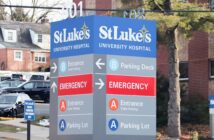Thirty-three percent of Lehigh’s undergraduate population lives off-campus as of Fall 2015, according to Lehigh Residential Services. The university, however, does not have the crime statistics for the majority of its students living in the off-campus region readily available.
Housing is only guaranteed to first- and second-year students, and the Bethlehem police force, rather than the Lehigh police, has jurisdiction over all crimes occurring on the South Side, including those pertaining to Lehigh students who live in the South Bethlehem community.
While the Lehigh police receive the data and reports regarding crimes affecting the roughly 1,661 students who reside off campus from the City of Bethlehem, they do not maintain an aggregated list of these crimes or have them accessible to the general public.
In compliance with federal law, all colleges and universities that receive federal funding are required to alert students about certain crimes that occur on campus and “on public property within and immediately adjacent to campus,” pertaining to murder, negligent manslaughter, sex offenses (forcible and non), robbery, aggravated assault, burglary, motor vehicle theft and arson. Lehigh complies with these laws by sending email alerts, and making the crime statistics available online.
In comparing the amount of email alerts students receive about crimes affecting students living off-campus with the extremely low rates of crime listed in the non-campus section of the online crime reports, Lehigh tends to compile statistics for the blocks immediately touching campus, but not the wider South Side area. By not including all students living off-campus in their crime reports, Lehigh is portraying only a small portion of the crimes in an area where a large percentage of students live.
Safety in South Bethlehem
Despite the semi-frequent emails students receive from Lehigh Police Chief Edward Shupp alerting them about crimes affecting students off campus, Lehigh’s crime statistics for a “Non Campus Building or Property,” state that there was only one robbery reported in 2014 and none reported in 2013 or 2012. There were no reported burglaries from 2012 to 2014.
According to reports from the City of Bethlehem taken over the course of 2010 to 2015, there were 114 reported cases of theft, 70 reported cases of burglaries and 18 reported cases of robberies on East Fifth Street alone – an area highly populated with students. While these reports contain the data for all residents living on East Fifth and not just Lehigh students, and cover a slightly longer time period, it gives a more comprehensive depiction of potential risks students may face when living off-campus.
Crimes committed in off-campus houses are reported to the Bethlehem police even if the house is occupied by a student because the Bethlehem police have jurisdiction over the South Side, according to Shupp.
Shupp said he receives reports of incidents pertaining to Lehigh students from the Bethlehem police, but he doesn’t have the exact numbers of how many students are affected by robberies, burglaries and theft.
“That’s not something that’s an easy thing for me to do,” Shupp said. “I don’t have the numbers without pulling reports.”
Wade Heubert, an adjunct professor of political science at Lehigh and a police officer for the city of Bethlehem, said that parts of South Bethlehem are safe, but students need to realize they are cohabiting in a neighborhood that is, for the most part, economically depressed. He said while there are some very nice neighborhoods and some longtime residents of the city, there are also a slew of absentee landlords and individuals who create a diversity of socioeconomic backgrounds.
Lehigh and the federal guidelines
Lehigh abides by the guidelines set in place by the state-required Pennsylvania College and University Security and Information Act, which is also known as the Pennsylvania Uniform Crime Reporting Act and the federally mandated Jeanne Clery Act.
The Clery Act, which was passed as a result of a murder committed at Lehigh in 1986 and now applies to all colleges and universities that receive federal funding, requires the relevant institutions to share and distribute information about campus crimes through timely warnings or emergency notifications.
The act specifies that “Certain crimes reported to campus authorities (campus police/security, officials with significant responsibility for campus and student activities)…on public property within and immediately adjacent to campus, and non-campus properties such as houses operated by officially recognized student organizations must be disclosed for the prior three calendar years.”
By sending out emails notifying students of off-campus crime and by having the crime statistics for incidents occurring on or immediately adjacent to campus accessible, Lehigh is adhering to the Clery Act.
It is unclear, however, what areas off-campus Lehigh considers to fall under the category of “immediately adjacent.” In contrast, other schools have elected to interpret Clery and the P.A. Uniform Crime Reporting laws more broadly than Lehigh.
For example, the crime reports at the University of Pennsylvania specifically states that it “reflects an expanded geographic area beyond the campus,” under the Pennsylvania College and University Security and Information Act.
Additionally, the crime report for Drexel University includes a map specifically indicating the crime reporting boundaries, according to their Clery Act and P.A. Uniform Crime Reporting webpage.
Student’s perspectives
Halli Sigel, ’16, a student who lives in the student apartment complex on Thompson Street, said she feels safe in her building. She said the doors to both her apartment and bedroom lock, and that she knows everyone in her building. However, she said she often feels unsafe when she walks outside to her car.
“I feel like there are never that many police officers patrolling the area, and there were recently two armed robberies the street across from ours,” Sigel said.
The apartment complex where Sigel resides has a maximum occupancy of 25 people and is therefore not a complete representation of where students live off campus.
“I don’t feel safe in my house,” said Jessica Smith, ’16, a resident of East Fifth Street. “The Lehigh police should include the off-campus crime statistics in their reports. When I looked at Lehigh I didn’t realize how unsafe the surrounding area was. Armed robberies have happened really close to where I live, which is really scary. I’m not comfortable walking alone at night.”
However, Justin Swarts, ’16, said he typically feels safe in his home on Fillmore Street. He said the strong police presence from both Bethlehem and Lehigh — and that East Fifth, Hillside and Fillmore streets are mostly occupied by students — takes precedence over his fears. He also said he thinks it is a “misrepresentation” for Lehigh to not include off-campus crime in their statistics.
Shupp maintained that the department reports meet federal guidelines and they do not require crime statistics for students beyond those that live on campus.
“We live in South Bethlehem and a lot of our social life, as well as where the majority of upperclassmen live is off campus,” Swarts said. “The school should include the crimes for off-campus and the surrounding area. While the local crime might make the school look bad, it will be a more accurate representation of the reality.”
Student’s responsibility
Heubert said locals know students constantly leave their doors unlocked and easy preventive measures such as locking doors and turning on porch lights can prevent the occurrence of crime. He said it is not uncommon to see students walking down the streets of South Bethlehem slightly “buzzed” and oblivious while they are texting and not paying attention to their surroundings. This behavior like this makes students an easy target, he said.
Heubert said three factors are essential for a crime to occur: means, motive and opportunity. Taking just one of these factors out of the equation will significantly decrease the occurrence of crime. While students have no control over another person’s means or motive, they can control the opportunity factor by always being aware of their surroundings. He said even closing blinds and turning on porch lights can make a difference.
Shupp said he believes living in South Bethlehem is safe as long as students take the necessary safety precautions.
“We have a duty to protect our students whether it’s on or off campus,” Shupp said. “But students also have a duty to protect themselves by using good common sense tools and utilizing their surroundings.”
More information on the Clery Act and state mandated campus reporting requirements is available online and through the Lehigh Police Department.





Comment policy
Comments posted to The Brown and White website are reviewed by a moderator before being approved. Incendiary speech or harassing language, including comments targeted at individuals, may be deemed unacceptable and not published. Spam and other soliciting will also be declined.
The Brown and White also reserves the right to not publish entirely anonymous comments.
1 Comment
One would think that the institution from which the Cleay Act was instigated would implement highest degree of compliance.